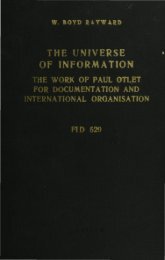improving music mood classification using lyrics, audio and social tags
improving music mood classification using lyrics, audio and social tags
improving music mood classification using lyrics, audio and social tags
You also want an ePaper? Increase the reach of your titles
YUMPU automatically turns print PDFs into web optimized ePapers that Google loves.
Starting from the dataset collected by the procedure described in Section 5.1, i.e., the 8,784<br />
songs with ternary information available, the author identified <strong>mood</strong> categories in this set of<br />
songs <strong>using</strong> similar method described in Section 3.1 <strong>and</strong> then selected songs for each of the<br />
categories. The following subsections describe the process in detail.<br />
5.2.1 Identifying Mood Categories<br />
The <strong>mood</strong> categories identified in Section 3.2 are not directly applicable to labeling the<br />
dataset, because those categories were identified from the most popular <strong>social</strong> <strong>tags</strong> in last.fm.<br />
The songs associated with those most popular <strong>social</strong> <strong>tags</strong> might be very different from the songs<br />
available for this research. On the other h<strong>and</strong>, with the method described in Section 3.1, it is<br />
straightforward <strong>and</strong> efficient to derive <strong>mood</strong> categories that fit a given set of songs. In fact, it is<br />
the strength of this method to be able to efficiently derive <strong>mood</strong> categories for any set of songs<br />
with <strong>social</strong> <strong>tags</strong> available.<br />
The process started from the <strong>social</strong> <strong>tags</strong> applied to the 8,784 songs in the dataset via the<br />
last.fm API. There were 61,849 unique <strong>tags</strong> associated with these songs as of February 2009.<br />
WordNet-Affect was employed to filter out junk <strong>tags</strong> <strong>and</strong> <strong>tags</strong> with little or no affective<br />
meanings. Among the 61,849 unique <strong>tags</strong>, 348 were included in WordNet-Affect. However,<br />
these 348 words were not all <strong>mood</strong>-related in the <strong>music</strong> domain. Human expertise was applied to<br />
clean up these words. Just as in identifying <strong>mood</strong> categories from last.fm <strong>tags</strong>, the same two<br />
human experts identified <strong>and</strong> removed judgmental <strong>tags</strong>, ambiguous <strong>tags</strong> <strong>and</strong> <strong>tags</strong> with <strong>music</strong><br />
meanings that did not involve an affective aspect. As a result of this step, 186 words remained.<br />
58
















